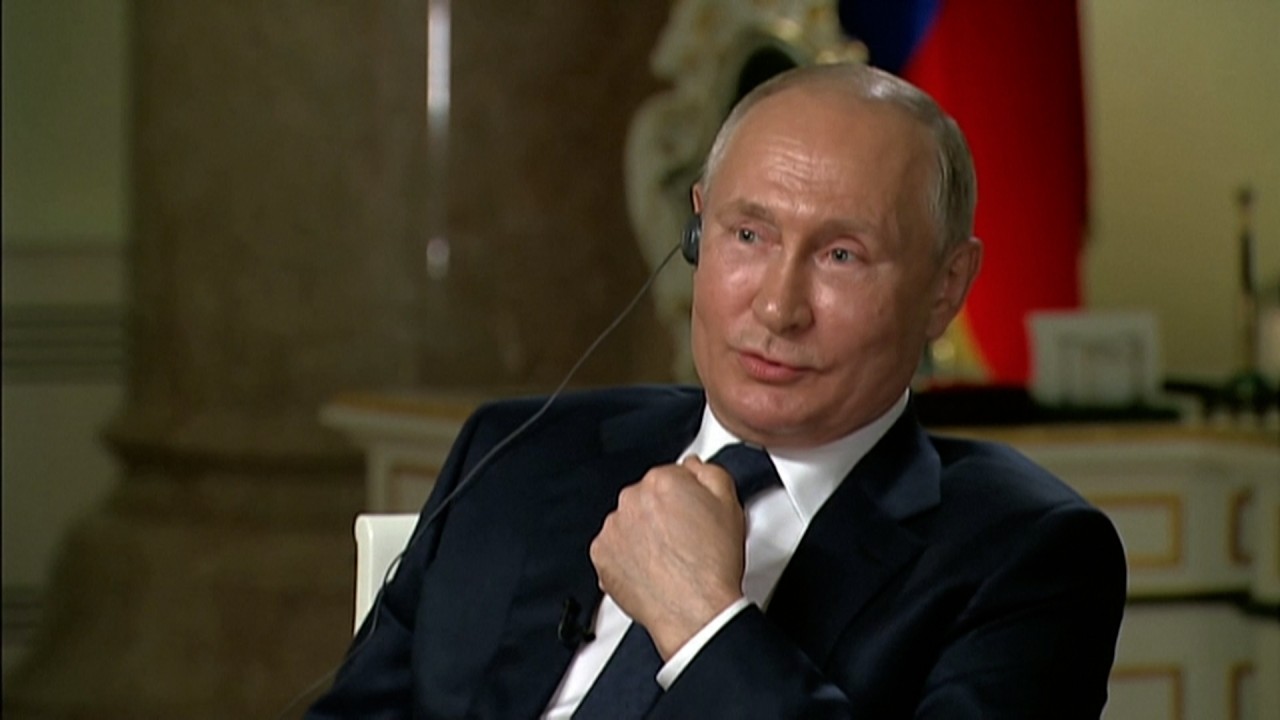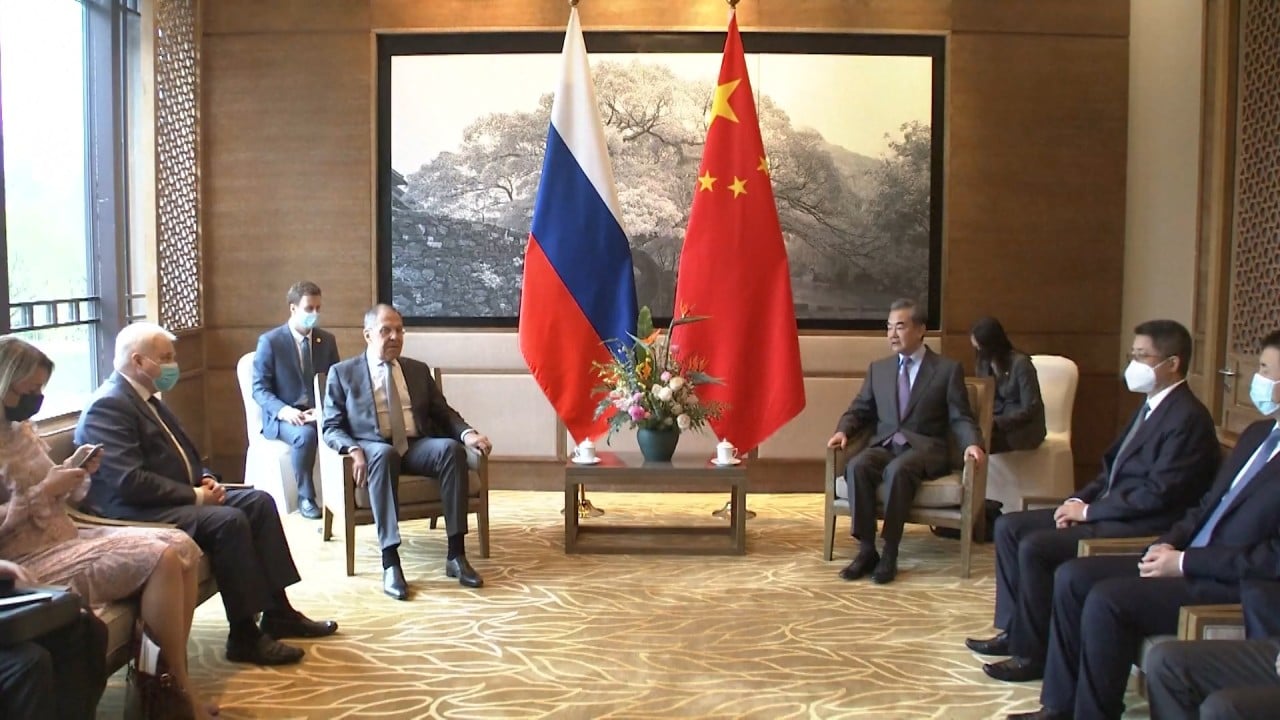
China-Russia relations: Xi and Putin show united front in message to Biden
- Moscow and Beijing deny they are looking to form a Cold War-style political and military coalition
- But in a turbulent world, they ‘need to strengthen strategic cooperation’
Instead, they hailed bilateral ties as “mature, stable, and solid” and each other as “priority partners”.
“Some countries use ideology to draw lines, brutally interfere in the internal affairs of sovereign countries, impose unilateral sanctions at every turn, shake the legal foundation of the international relations system, including the arms control field,” the statement said.
“The more turbulent the world, the more it is necessary for China and Russia to strengthen strategic cooperation.”

01:22
Russian leader claims Russia-China relationship being sabotaged
It said that in the face of such adversity, both sides needed to strengthen coordination and cooperation on political, security, military, economic, energy and technology, “defend common interests on the international stage” and “continue to practice true multilateralism” to maintain the balance of international power.
“Russia needs a prosperous and stable China, and China needs a strong and successful Russia. China and Russia regard each other as priority partners,” the statement said.
Shi Yinhong, an international relations professor at Renmin University, said that as the Western alliance led by the US increasingly confronted both China and Russia, it was natural that the two countries “feel the urgency to strengthen their quasi-alliance relations”.
“Such ties will be further strengthened if China-US and Russia-US confrontations become more intense,” he said.
China and Russia ready to shoot for the moon with ambitious research station plans
According to Danil Bochkov, an expert at the Russian International Affairs Council, it is rare to see the mention of “priority partners” in official documents, although leaders and top government officials have touted the Russia-China strategic partnership as a priority for both sides.
“The idea entails that both states, while prioritising their international relations with other global actors, give specific attention to contacts with each other first,” he said, especially when it came to the Covid-19 response and allegations of human rights abuses.

Bochkov noted the close ties between Xi and Putin, who have met more than 25 times and called each other their best friend, was an important cornerstone of bilateral ties, which “enables Moscow and Beijing to discuss most sensitive issues in a sincere and open-minded setting”.
The US and its allies have in recent years repeatedly expressed concerns about warming ties between China and Russia, especially their growing military cooperation and joint exercises.
While Beijing and Moscow vowed to improve military cooperation, including through “an increase in the number and scale of joint combat training missions”, the statement said the partnership was not “a political and military alliance in the Cold War era”.
China, Russia extend friendship treaty after Biden-Putin summit
Another highlight of the Xi-Putin summit was the renewal of the 2001 Treaty of Good-Neighborliness and Friendly Cooperation, in which both sides agreed to set aside their border dispute and to not claim disputed territories.
Pointing to a particular provision in the treaty about immediate consultations should a military threat arise, Bochkov said it was crucial for both states to guarantee that they remained friendly in case of military confrontation.
“It is a very comfortable formula of Russia-China cooperation which provides some room for manoeuvring but guarantees that both sides would not turn rival to each other,” he said.

01:12
China, Russia foreign ministers meet as countries stand ‘back to back’ amid rise in US tensions
Zhang Xin, associate professor of international relations at East China Normal University, said Beijing and Moscow would seek to “challenge and shake” the Western democracies’ “absolute authority and legitimacy” over international norms.
“China and Russia may also boost the joint development of hi-tech weapons, in a bid to counterbalance the US. In addition, there will be joint military drills, especially long-range naval or air force exercises and patrols, during which they may enter the space where they rarely have showed up in the past,” he said.
“They will also together resolutely oppose the deployment of short- and intermediate-range missiles by the US and Nato in Europe and the Asia-Pacific region through both hard and soft means.”
Despite their deepening ties, it would be far-fetched to talk about an anti-US military alliance, given the limitations of Russia-China relations, Shi said.
A closer US and Russia makes India hopeful. China, not so much
“The military cooperation will primarily be Russia providing China with hi-tech equipment and military high technology. Moreover, joint military exercises are likely to be conducted in various marine space and also on land,” Shi said.
“But I don’t think Russia will show close military relations with China on Taiwan, nor will China show close relations with Russia on the Ukraine issue. China and Russia are not willing to provoke a large-scale military conflict with the US-led West for each other. This is one of the key national interests for both countries,” he said.
Artyom Lukin, an associate professor at Russia’s Far Eastern Federal University, said there were also some tensions in Russian-Chinese relations, such as Russia’s unease over China’s growing reach in Central Asia.
“But so far those differences have mostly been of peripheral significance to the bilateral relationship. For the foreseeable future, there is much more that unites Russia and China,” he said.
Additional reporting by Rachel Zhang

